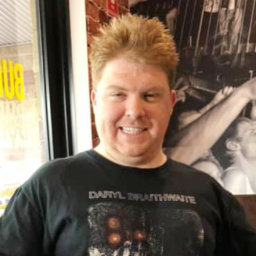EARNING OUR WAY IN LIFE
One of the more common concerns that I’ve heard from fellow high-functioning autistic people is whether or not they’ve truly earned what they have. To clarify, many people with ASD wonder if whether the things they achieve in life are actually the result of their own hard work, talent, and skill, or if they were simply handed “success” out of pity or obligation because of their disability. “Did I actually get the job because I was the best candidate out of the applicant pool,” for example, “or did I only get the job because I was some disability quota or because the people hiring felt bad for poor, little, ol’ me? If I were neurotypical, would I have stacked up to the other applicants?”
Some may read this and ask, “why does that matter? If you got the job just be thankful that you got the job and move on with your life.” There’s a pleasant simplicity in that notion that some may be perfectly happy to adopt, and there is no inherent problem with adopting it, but to a lot of people with ASD it reeks of naïveté.
In my previous blog, I wrote about the tendencies of high-functioning people with ASD to constantly question themselves. Indeed, this was the blog I was trying to write when the depth of that topic on its own rather got away from me.
It is a common anxiety for people with high-functioning ASD to worry about whether or not they’ve actually earned the things they’ve achieved. How much of what they’ve achieved is because they actually put in the time and effort and skill needed to achieve their goals, and how much of it was being handed things on a silver platter because of some quota or out of pity? This was a concern posed both by myself before I joined Spectrum Fusion, as well as another of our candidates whom I have had contact with.
THE QUEST FOR INDEPENDENCE
It’s a terrible feeling, not knowing whether you’ve actually earned your successes or not. After all, one of the main goals that most people with ASD expresses to have is that they wish to live “independently.” They wish to be able to make decisions for themselves, live ordinary, self-governing adult lives, and they want to achieve success through their own merit. How can we say we are living ‘independently’ then, if our successes are only gained not through our own merit, but instead through the initiative and influence of other people who simply take pity on us, or make allowances for us, for whatever reason?
I am reminded of a moment from another movie (as I often am, since movies are one of my “things”) as I write this: The 2011 superhero film, “Green Lantern.” A significantly worse film than Kung Fu Panda 3, but one with a singular moment that no less stuck out in my mind. There is a scene in the film where one of the villains of the movie, Hector Hammond, is given a job by his wealthy and influential father. Hector had previously assumed that he had received this job because of his own merit and talent, and is crushed to find out that the only reason he got the job was because his father pulled strings to get it for him. When he expresses disappointment about the situation, his father is dismissive and bluntly tells him that it’s simply “the way of the world.” This is one of Hector’s defining character moments and is one of the events that ultimately leads him down the path to villainy.
“Green Lantern” may not be the world’s greatest film (and in fact, it is an absolute dumpster fire of a movie), but since my diagnosis in early 2016, that moment has stuck out as particularly relatable in my mind. Nobody wants to be Hector Hammond (for more reasons than the obvious penchant for evil and the shockingly ugly giant head). Nobody wants to feel like their successes were arbitrarily granted to them for any reason other than their own merit. Those of us with ASD don’t want to be handed things out of pity, and we don’t want the whole reason that we achieve ‘success’ to be because of an aspect of our personalities that we have little control over and that many of us actively hate about ourselves (though you can perhaps see my previous blog to begin working on that).
It was this concern that I myself held, and have heard expressed to me since, about joining Spectrum Fusion.
OPPORTUNITY VS. OUTCOME
Before joining Spectrum Fusion, I worried that this was simply going to be another program that gave me hand-outs because I was disabled. I worried it would be some sort of ‘pity program’ that would basically hand me a low-paying, unenjoyable job of some kind, not because I earned it, but because a well-intentioned-but-naïve person thought they could help those “poor, unfortunate autists who need somebody to hold their hand.”
Having experienced being handed things based on my disability, I can say with great excitement that Spectrum Fusion is NOT that. Having been a part of the organization for about six months now, it is very clear that Spectrum Fusion is an entirely different animal, and the Reactor Room does not just hand out jobs on silver platters.
What the Reactor Room gives to its members is not outcomes, but opportunities.
Heidi Ham and Spectrum Fusion have rightly identified that one of the bigger problems plaguing those with High-Functioning ASD is a lack of connections and know-how when it comes to entering the fields of our choice. This follows, as one of the most common issues that people with ASD have is that they are socially awkward and do not feel comfortable in social situations. This naturally leads to us not making many friends or contacts, thus we have fewer connections, and thus we have fewer opportunities brought to our attention.
What the Reactor Room does is give us a platform. It gives us a stage to stand up on in front of many potential contacts and connections who have the know-how to get into whatever our chosen field is and help us reach our goals; the keyword being help and not just granting us things willy-nilly.
Because our work is all our own.
PROMOTING OUR TALENTS
One of the more positive aspects of having autism is that those of us with the disability tend to be specialists rather than generalists. To use a metaphor, if your average person is a “cheap swiss-army knife,” then we who have high-functioning ASD tend to be the high-end electronic screwdrivers, chefs’ knives, garden shears, and chainsaws. We are tools with a specific purpose that we do well, while everybody else is forced to multitask with lesser versions of those tools. The downside is that because we can’t multitask as well, we aren’t as able to go out and socialize and make these connections for ourselves.
Since joining Spectrum Fusion, I have been introduced to artists, craftsmen, photographers, videographers, and more, who were all plainly excellent at their trades. But all of these people, for one reason or another, found it difficult or downright impossible for them to make the connections and contacts needed to find a better outlet to utilize their talents.
This is the brilliance of the Reactor Room’s model. By spending so much time with every individual who joins the program and identifying their individual needs and talents, they are able to construct a panel of contacts unique to every member’s situation. From there, the member is the one who has to demonstrate just how talented and skilled they are. It is akin to a big talent show, where we can show off just how good we are at our specific talents and fields and prove to a group of influential people that we can do the job and do it well, and that we deserve to be rewarded for it; that we DO deserve success based on our merits.
STARTING ON THE PATH TO SUCCESS
Since my experience in the reactor room, I have managed to use my newfound connections to get an article published in a magazine. This is a large step forward for me, as before this point I had previously been unpublished. The editor of the magazine in question, however, was not informed by my connection that I had ASD or any sort of disability. He agreed to publish my article not out of pity, but because he felt that my article was good enough to be published.
This is what the reactor room offers, and what sets it apart from other initiatives. It doesn’t offer immediate “success.” It offers the opportunity for success for people who previously had trouble finding opportunity in the first place; opportunity rather than outcome.
To make the actual, final leap to that outcome, well… that’s all on us. And we’re more than capable of making that leap.






